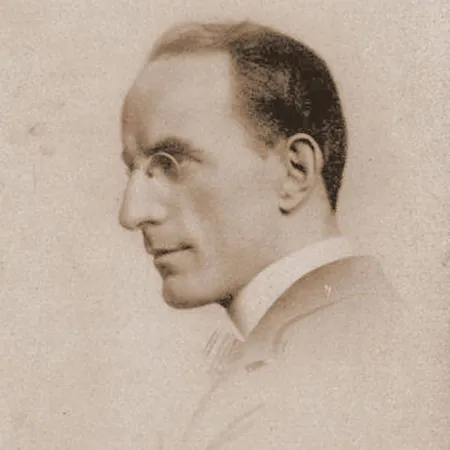The business sense, motivation, and promotional skills George C. Williams brought to the Ithaca Conservatory of Music provided the energy and influence that helped sustain the school in its infancy. The conservatory's second leader, Williams led the effort to obtain the charter that allowed the institution to become Ithaca College.
A Tompkins County native, Williams returned to Ithaca in 1897 from Nebraska, where he'd directed two schools of oration. Conservatory founder W. Grant Egbert hired Williams to create what would become the Williams School of Expression and Dramatic Art. Williams also had planned to attend Cornell University and work toward his goal of becoming a Presbyterian minister. However, because of his flair for entrepreneurial ventures, he was named the conservatory's business manager and his ministerial plans were sidetracked. It's been said that without Williams's business and advertising skills, the fledgling conservatory might not have survived.
Williams initiated or assisted several financial ventures meant to lead the school to fiscal solvency. These ranged from his becoming a primary stockholder with Egbert to taking on, temporarily, the full debt load himself. A dedicated thespian, Williams organized students into performance companies that toured the country and Canada, touting the benefits of an education at Ithaca. One of his most noteworthy -- though controversial -- initiatives was a commission system for compensating faculty and administrators. He also set about personally recruiting many of the school's nonmusical faculty members.
In 1926 the charter was amended to change the name to the Ithaca Conservatory and Affiliated Schools. By 1929 the conservatory counted among its affiliated schools the Ithaca Institution of Public School Music, the Patrick Conway Band School, the Williams School of Expression and Dramatic Art, the Ott School of Chautauqua and Lyceum Arts, the Martin Institute of Speech Correction, and the Ithaca School of Physical Education.
Among Williams's most influential acts was securing land rights for property near the College's present-day location on Ithaca's South Hill. Although the rights lapsed, due in part to the Great Depression, this visionary deed planted a seed for the institution's future. The move wasn't made for several decades. The transformation of the institution continued, however, when the state granted the conservatory a new charter and name change in 1931.
Williams stepped down as president in 1932, but aspects of his vision for the College would be realized in future years, including accreditation and the move to South Hill.
Williams was born July 23, 1874, in Dryden, New York. He graduated from Boston's New England Conservatory College of Oratory in 1893 and obtained an additional bachelor of oratory degree in 1894 from Boston University. That same year Williams accepted an offer to organize a drama and public speaking department at the Nebraska Conservatory of Music. In 1895 he established his own Nebraska School of Oratory.
Leaving Ithaca but taking his leadership and oratorical skills with him, Williams moved to Florida and became a lay preacher -- he'd waited many years to enter the ministry. For most of his remaining years, he also led the William Jennings Bryan Bible class, named for the U.S. secretary of state and three-time presidential candidate. Williams improved and expanded the 7,000-plus member class so much that it was renamed in his honor.
Williams died December 28, 1971, in Miami Springs, Florida.
